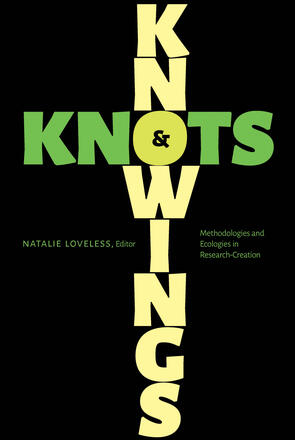
Knowings and Knots
Methodologies and Ecologies in Research-Creation
Description
Knowings and Knots presents a range of interdisciplinary perspectives on the methodology of research-creation and asks how those who make knowledge think about and value it. Not just a method but a site of ongoing experimentation around what counts as knowledge, research-creation is a meeting place of academia, artistic creation, and the wider public. The contributors argue that academic institutions and funders must recognize research-creation as innovative knowledge-making that leaps over the traditional splitting of theory from practice while considering how gender/feminist studies, Indigenous practices, and new materialism might inform and develop the conversation. Through this book, readers can transform the way they experience both art and education.
Contributors: Carolina Cambre, Owen Chapman, Paul Couillard, T.L. Cowan, John Cussans, Randy Lee Cutler, Petra Hroch, Rachelle Viader Knowles, Natalie Loveless, Glen Lowry, Erin Manning, Sourayan Mookerjea, Natasha Myers, Simon Pope, Stephanie Springgay, Sarah E. Truman
Awards
- Winner, Book Design of the Year | Alberta Book Awards, Book Publishers Association of Alberta 2020
Reviews
"This book opens up to the doing and undoing involved in the generation of research-creation, the makings of new forms of knowledge, and what it is to work at the interstices -- the interstices of thinking-feeling, of bodies, human, nonhuman, entangling with places and other communities, ecologically."
- Jennifer Clarke, The Journal for Artistic Research, July 2020
"The editor and authors engage themselves, each other, and wider communities creating a wealth of intricate insights, understandings, and possibilities about research-creation... Knowings and Knots promotes research-creation discourse and contributes to research discussions and debates in 21st century universities. Its value to K-12 educational environments, teachers, and teacher educators comes from persons sharing ideas about arts and humanities research-creation here."
- Robert C. Kleinsasser, The Journal of Educational Research, July 2020